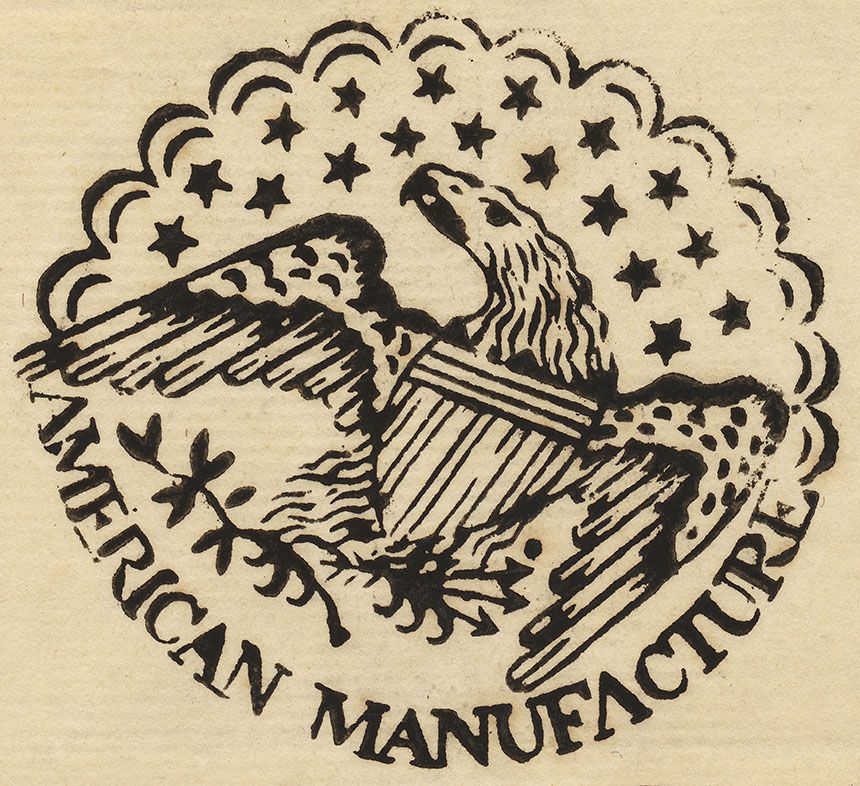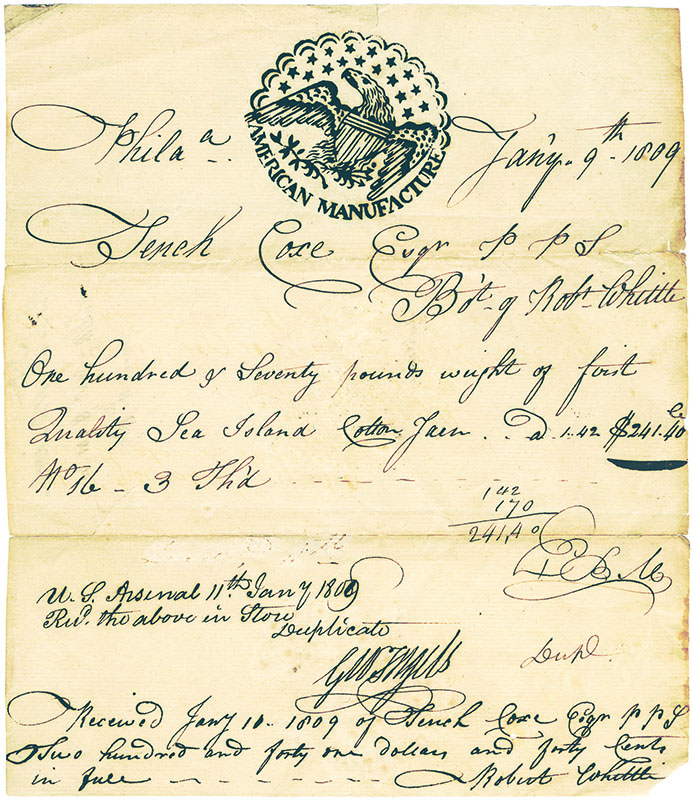Made in The USA


Many items of historical ephemera bring fresh things to think about, new subjects to explore. An impulse buy at one ESA annual auction lead me down some interesting roads. The lot was an 1809 billhead/receipt with an unusual and interesting eagle-and-stars device at the top, surrounded by the words “AMERICAN MANUFACTURE.” The document struck me as a bit odd in that it bore no company name or location.
The item turns out to be of some historical significance. It is a receipt for “One hundred & seventy pounds of Sea Island cotton yarn,” bought of Robert Whittle by “Tench Coxe, Esq. PPS.” Therein hangs the tale.
Tench Coxe of Philadelphia was a complex and fascinating figure. A prominent personality before, during and after the American Revolution, he was a friend of Jefferson and Madison and a correspondent of Franklin. Trained as a political economist and a lawyer, Coxe served as a commissioner to the 1786 federal convention at Annapolis, as well as a Pennsylvania delegate to the 1788-89 Continental Congress. During the formative revolutionary period Coxe was a tireless advocate about the right to bear arms, and about . . . American manufacture. Later dubbed “The Father of the American Cotton Industry,” Coxe helped to draft and edit Hamilton’s important plan to industrialize the United States—the 1791 Report on the Subject of Manufactures. Coxe provided most of the statistical data, and a good bit of the conceptual framework. Hamilton believed that the future of America would depend upon manufacturing rather than agriculture, and advocated for protective tariffs to protect and grow American industries. The economic principles laid out by Hamilton and Coxe would later be incorporated by Henry Clay into the “American School” of economics. Abraham Lincoln—a self-described “Henry Clay tariff Whig”—assimilated what were essentially the Hamilton/Coxe principles into his platform for the Republican Party.
Tench Coxe encouraged the building of American factories and industries to supply the fledgling country’s needs, whenever possible, rather than purchasing goods from Europe. He was the first and most relentless advocate for the raising of cotton in the South. Coxe dispatched an agent to England to pirate away the then-secret technology of the Arkwright textile milling machinery and bring it to the United States, but his man was caught in the act and seized just before he set sail with a set of brass models. A year later Samuel Slater succeeded in importing that same technology to Pawtucket, RI, where in 1793 he established our first mill to convert cotton into cloth. The Slater Mill is considered to be the birthplace of the American industrial revolution.
It can be argued that Coxe played a pivotal role in moving the new nation toward an industrial North and an agricultural, cotton-growing South . . . with its burgeoning demand for slave labor to plant and harvest the crop.
Coxe published reports and books tracking the progress of all sorts of American industries and he reported the capacities and outputs of each in detail, state-by-state, town-by-town. A participant in the Pennsylvania Society for the Encouragement of Manufactures and the Useful Arts, he delivered numerous speeches on the subject. Benjamin Franklin and David Rittenhouse gave substantial publicity to Coxe’s efforts.
Tench Cox personally invested in various industries. He initiated the process of large-scale investment in North Carolina, land known as the “Speculation Lands,” acquiring for himself some 400,000 acres (at 9¢ per acre!). His descendants were prominent in the industrial and other development of the Asheville area.
Coxe had a tumultuous political history. He resigned from the Pennsylvania militia in 1776 to march as a Loyalist into Philadelphia with Howe’s command; arrested, he asked forgiveness and became a Whig and an ardent patriot. He then joined the Hamilton camp as a Federalist, and was appointed in 1789 as Hamilton’s Assistant Secretary of the Treasury. In 1792, President George Washington appointed Coxe Commissioner of the Revenue; Adams removed him from this position. Coxe then switched his loyalty to become a Republican, and Jefferson appointed him Purveyor of Public Supplies, a War Department post which he held from 1803 to 1812. Coxe also served for a time as a leader of the “Quids”, a faction of disaffected Jeffersonian Republicans.
This 1809 AMERICAN MANUFACTURE document served as an order from Coxe, in his position as Purveyor of Public Supplies (PPS), for Sea Island cotton for the military. It is also a signed receipt for payment to Robert Whittle, and a signed receipt (”Geo Ingalls”?) as the goods were put into inventory at the U.S. Arsenal. The latter signed receipts are marked as duplicates, there apparently being a desire to have the entire transaction recorded on this one piece of paper.
A wonderful thing about printed ephemera as windows into the past is that one exploration often leads to another and another and another . . .

Tench Coxe

A printed notice by Coxe, in his position as Purveyor of Public Supplies.

Coxe had an enormous influence on the establishment of the cotton industry in the South, and thus also on the institution of slavery.
